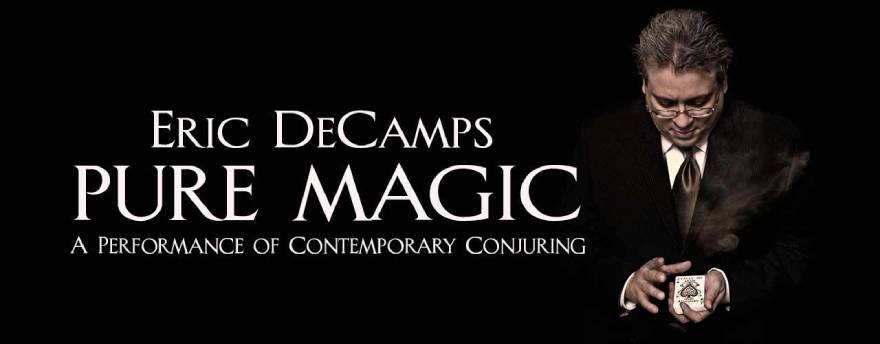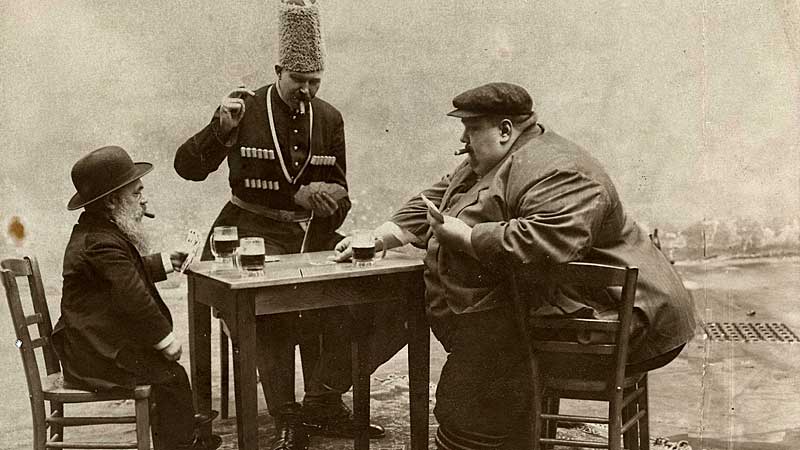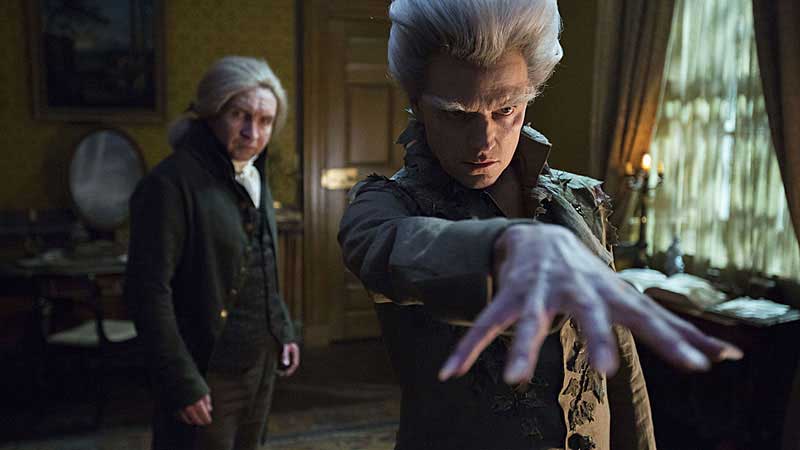Eric DeCamps "Constructing a Theater Show for the Big City" Podcast Interview
by Christian Painter and Roland Sarlot

What We'll Explore
Eric Decamps describes his process of creating an emotional and impactful experience that builds trust, connects emotionally, shares your passions and personality, and communicates with the audience honed through listening over and over to your guests.
Who is Eric DeCamps?
Eric Decamps won the prestigious gold medal award from the S.A.M. He is one of only two people who have ever been given this award. He now lives in New York City, where he has launched many off-Broadway, one man magic shows. He has toured his shows in New Jersey, Texas, LA, Chicago, Indianapolis, and Montreal. He mentors young magicians by sharpening their skills to engage, maintain, and entertain an audience.
Running Time:
The following interview has been edited and condensed for clarity.
What you can do
You are welcome to share up to 500 words of the below transcript in a non-commercial purpose provided you credit and link back to our site like this: "The Magic Oracle Business Podcast".
The Interview
Christian Painter: In this episode of the Magic Business Podcast, we'll reveal this and more...
Eric Decamps: At the end of the day, when they're finished, they have to feel that they know you. Whether they know the true you, they got to know that true character, that character, and feel the honesty. This guy is telling me something about him. That's what art is.
Christian Painter: Welcome to the Magic Business Podcast. This is where we share insightful and delightful inner secrets about the business of magic. Here is where magic professionals are going to share some of their real life experiences and some of their most guarded secrets to help further your career in the magical arts. I'm your host Christian Painter, in partnership with the MagicOracle.Club, where you can hear all of our magic business podcasts.
Eric Decamps won the prestigious gold medal award from the S.A.M. He is one of only two people who have ever been given this award. He now lives in New York City, where he has launched many off-Broadway, one man magic shows. He has toured his shows in New Jersey, Texas, LA, Chicago, Indianapolis, and Montreal. This is a two part podcast about creating and selling your show to a theater audience. This episode examines the product, how we build a quality show that audiences will love. We'll discuss the selling of the show in the second installment. Welcome to the show, Eric.
Eric Decamps: Hey, good to see you. I mean, good to hear you, Christian.
Christian Painter: [Laughs] This is audio only. I want to share with my listeners, I heard about you for a long time and tried to see your show. And somehow I always just missed it. In fact, one time you were in Chicago, which wasn't too far away from me, and I missed you. But I'd always heard, "Oh, Eric's really good," and then I would ask, "Oh, what's he do?", "Well, he does classical magic", and you have that half beat where you're like, "That doesn't sound exciting." And then I actually got to see you perform, finally. And I became an instant fan. And because I think it's not... Because I think when people just say, "Oh, he does classical magic", they're not really hitting the fullness of what you really put into a performance. And so that's why I'm really excited to have you. How do you develop a show?
Eric Decamps: Well, what happens is, first of all, I have a series of effects that I've worked on for a long time. And then I, put them all on slips of paper and move them around. Today it's easier because you have Word, and you can move things around. And then I look and see, what would be, what I would think would be a good opener. What would I think would be a good middle material, and then what I feel could be a good closer. And to me, like when I was designing my act for FISM back in 1990, I knew that I only had 10 minutes to my set at that time. So I know I needed to have a fast strong opener, which I developed. I produce a glass out of fire, and I think that's important because that's your establishment. It establishes you as a master of your craft. And then you can produce coins, from fire. And then I would go into my handling of the coins and cylinder, John Ramsey's coins and cylinder. And then of course into my three cup routine.
Eric Decamps: But it's important that even if you do it slowly, they have to trust you. And the audience in an opener has to feel "Well, this guy's interesting, he's engaging. I find him interesting." And you only have about what, 30 seconds or so before an audience realizes whether or not they're going to gift you with their time and their attention. So you need to really establish it, maybe not in a flashy way, but if they find you interesting and engaging, they'll listen. And if they feel that there's going to be a payoff at the end, they'll focus their attention and give you their attention.
Christian Painter: Okay, so you already said that as an opener, you want something that's going to hit them fast.
Eric Decamps: In my particular case, yes. That's what I do. And I've maintained that for a long time now. For me.
Christian Painter: No, I understand. And how long would you say your openers tend to be?
Eric Decamps: This particular opener that I use now in the show in the Pure Magic Show is probably under a minute and a half, 90 seconds. And I produce a glass out of fire because that's important. I welcome the audience and then boom, there it is. And now I know, I have their attention and then I immediately go into my second effect, which was of course, producing coins out of fire and dropping it in the glass. So dropping in the glass is important because not only do you get the visual, but you get the audible when I dropped the coin inside of the glass. So then they know it's solid.
Christian Painter: Right. And you said something-
Eric Decamps: And they know it's real, that's important.
Christian Painter: Yes. And you said something interesting that I want to make sure our listeners really pay attention to.
Eric Decamps: What's that?
Christian Painter: When you said, when you start to work on your show, you look at pieces that you have already done, that you already know. So you're not starting a show with like, "Hey, I think I'll just learn these five pieces and make them into a show" because that's really not probably going to happen.
Eric Decamps: No. No, I mean, I always rejected the idea of a guy coming into a magic shop saying, "I have a show tonight, what's new here that I can do for tonight?" That would always... Please, I work months, years on a piece until I feel that it's ready with an audience.
Christian Painter: And, and now let's talk, before we get into middle, because the middle has a lot. I think people have a tendency to just say middle, but we're going to cover that. And the middle has a lot of nuances, but let's talk about, the ending pieces. So your closers, what goes through your mind then, for your closers?
Eric Decamps: Well, your closer is important because that's your last impression. That's the impression that the audience is walking away with. And I think it's very important to be genuine, in that piece. And it's has to be impactful. So like I was talking to you about my reinterpretation of Dean Dill's box. That's my closer in the show. And I think it's really strong. I know it's really strong because when I started doing it, the reaction from laypeople, because that's the whole thing, my act and my magic is designed for laypeople. Yes, magicians can enjoy it. That's great. And I'm happy that many magicians enjoy what I do.
But if I'm going to spend the time and the effort, I am going to make sure that the piece that I'm working on can work on both levels, both the magicians and for the laity, that's regular audiences. That's really important to me because that they know, at the end of the day, magic is an art form. When it's well done, it can achieve art status. And I want people, an audience, to realize and feel the passion that I have for this art form. And I want them to go, "That is something special. Magic can be an art form."
Christian Painter: So let's get back to the Dean Dill box, which you end with. You decided on that because why?
Eric Decamps: Because it's different. Not too many people, I mean, people do it, but again, the people I've seen do it for the most part, do it rarely.
Christian Painter: Very few, I can't even say, but so few people come to that piece, very few.
Eric Decamps: And, it's more like a puzzle to me, when I've seen it done, and it's clever, but it doesn't tie me emotionally. And it's important, that the audience get the emotion in what you do, and the passion that you have. So my storyline is a historical storyline. I take artistic license with some of the parts of the routine, but I took a three-phase routine and made it into a seven-phase. Okay? And each phase builds up to the finale.
And one of the biggest compliments I've ever gotten, when I did the routine, I did it at a conference that was held up in Canada and Max Maven was in the audience and he was sitting in the front row. And at the end, I got a standing ovation, when I did the box, and Max came up to me and goes, "That was great. I loved it." And I said, "Oh man, you have no idea." I love Max. And how much that meant to me. And I just looked at him and I said, "Hey, Max, how long do you that piece runs?" He said, "What, four, maybe five minutes?" And I just smiled. I had a grin from ear to ear because the piece runs 10 minutes long. And I told him, "It runs 10 minutes." And he looked at me and he goes, "No." So that's when I knew that this piece is engaging, because they lose track of time. That's really important.
Christian Painter: And, for the listeners who haven't seen the show, one of the things I found interesting when you did that was you actually let the spectator touch the box. They actually hold the box, and inspect it. And there's a little part of me that was like, "ah, ah" because the box is expensive and probably very difficult to get now. But, but I believe that it helped really draw in the audience.
Eric Decamps: Mine is different. Mine is way different. It's not the original box.
Christian Painter: Oh, so you made that.
Eric Decamps: I redesigned the box. Yes, but it's okay, I want the box to be examined. I need them to touch it. I like to hand out my stuff.
Christian Painter: Yes, I thought that was fantastic in bringing them, even in like, "No, it's not just some magic prop. It's just a box. He let the guy hold it." And I think that really brings them in.
Eric Decamps: Right. But the box and the storyline has a historical reference to it and has historical meanings. And it has meaning to me, a personal meaning to me, in how I obtain the box. It's all part of a storyline. And, I found that the audiences really dug it. They really got into it. Because I wasn't sure if it was going to be well received. I had only hoped, but you don't know until the end of the day.
Christian Painter: No, well, so many mysterious things happen in that box while you're, while you're showing us. And it just keeps... and then you keep showing it's just a box it's just empty. And it's quite...
Eric Decamps: That's it.
Christian Painter: You see the... It was a great show.
Eric Decamps: Thanks.
Christian Painter: But now, let's talk about the middle. And going back to the box again, I again, want to say, I want to make the point of, you hardly see anybody do that box, and it's interesting, you choose that piece as your closure, because no one else is doing it. And it sets you aside where, when I look at how many people use a closure that, like for instance, "bill in lemon", which is ubiquitous. Everyone does it. And you had the very conscious choice, "I'm going to close with something that is rarely done." And I think that's an important point for, for many people who are designing a show.
Eric Decamps: Yeah. And done in a formal setting, as opposed to just, over the counter magic trick.
Christian Painter: Yes.
Eric Decamps: I think that's important.
Christian Painter: Now, we'll talk about the middle, which I think a lot of people kind of write off as just, "Oh, it's just some tricks we do in between the closer and the opener" but the middle really establishes-
Eric Decamps: Well, it kind of is. But...
Christian Painter: But it establishes...
Eric Decamps: It establishes your character.
Christian Painter: Yes.
Eric Decamps: I think the middle, the middle part... Here's the thing. I mean, there's a lot of ways of designing the show. I mean, you can design a show where the effects are so well integrated to the storyline, that it's like one long piece with no breaks in it. I don't do that. I like to have individual pieces that are like individual vignettes. Yet they still can maintain the through-line. And the through-line is maybe, doing classical magic pieces. And most of the presentations in my show is about, the classics of the art form, and how much I love them. And, it's important that during that show, you show different degrees. And I think it's important also, to me specifically, to have a variety of effect. I mean, I don't want to do seven card tricks. I don't want to do 12 coin tricks. I want to do a card trick, maybe two card tricks, do a coin trick, do a thimble trick, do a torn and restored paper trick, do something completely different, a mind reading piece.
Everything in my show has a different type of effect to it. And the reasoning for that is... I do thimbles, okay? And I do a thimble routine, which is very strong. I want the audience, in case someone in the audience is thinking "I hate card tricks, but that thimble trick was really clever. I liked that." Or "I don't like coin tricks, but that paper trick how he made that transposition and how it got restored? And that was very clever." Or the coins. "Oh my God, how he made do", that gives them a variety. So if they don't like one specific thing, there's got to be something in my show that you're going to like.
Christian Painter: Well, I agree. Your show is very... varied. I mean, I guess that's the word I want to use it. You have... we're doing ups and downs.
Eric Decamps: Yeah, the variety.
Christian Painter: But beyond that, I want to talk about your character because of course, that's very important to making the show interesting because you truly come off as a magician who has studied these old tomes and now, you want to share them with the audience. But you don't, like, I've seen many magicians make it goofy, or they talk in a way that it's very tongue in cheek. But you don't do that, you really, even though you're making us laugh at times, you take the magic very serious.
Eric Decamps: Mm-hmm [affirmative], right.
Christian Painter: But how did you develop this character? Where did you come from, with that?
Eric Decamps: Well, I used to be very aggressive with my performances. That's because I was working in the nightclubs in the city, and New York audiences are not very forgiving, so you really have to hit them over the head. And then I started changing my style and pulling back. I'm not saying that I don't get excited about my pieces, but I think it's important to show different degrees of your personality. And my character, the character that I have, is not necessarily my day-to-day person. It is based on that day-to-day person, but it's hopefully a more likable version of me, where people will like it and find…
And I also think, specifically in magic, is that if you're going to be that magician that comes out and every card is produced perfectly and your suit is perfect and everything is perfect. And you're the flawless guy up there, they're not going to relate to you. Audiences are not going to relate to you on that. Audiences are going to relate to the guy who has some flaws to him, to make him human. And because that's something they can relate to and engage and lock in on, "Oh, how's he going to... Is he going to get away? Yeah. Is he going to do it like Houdini, is he going to make that escape? Is he going to die?” It's important, that you show vulnerability in what you're doing, and that you're walking a line.
Christian Painter: Right.
Eric Decamps: You're walking a tight rope, and maybe this will work. Maybe this won't work, because that keeps, I think maintains, their interest.
Christian Painter: When you're building the show, you're building it from truths. And, I see a lot of magicians, and they try to make up these crazy stories sometimes, that they're not believable anymore. And then they wonder "Why isn't my show authentic. Why am I not really connecting with the audience?" Where, you have chosen that way of, I'm going to tell you truth. And as you said, we'll wrap some fantasy around those, but we're starting in a truth. And I think that's why the audience is drawn in. That's why your shows are good.
Eric Decamps: At the end of the day, when you're finished and they're leaving, they have to feel that they know you. Whether they know the true you, they got to know that true character, that character and feel that honest, "This guy is telling me about something about him." I mean, that's what art form, is, and it doesn't matter the medium, it doesn't matter that medium, whether it's painting, whether it's sculpture, whether it's music, it's about communication. It's about you communicating. And the best way for you to communicate and what we do. I mean, listen, let's face it. Magic takes an audience into a world that most theater do not go to. And that is, we break the fourth wall. We need, we don't just break it, we crash through it because we need that audience participation. We need their attention. They need to be focused and the more focused they are, the better it is for you as a performer. Because that way you can guide them the way you want to guide them, so that you can, like a gentleman, deceive them and make them feel like they're witnessing magic.
Christian Painter: I like that. One thing I want to say about your show, is, when you watch it, you know that you're watching a strong magician. And although there are funny moments in your show, you definitely have some great humorous moments, you're not a comedian. Where do you find these jokes? How do you find these funny moments? Do you have other people help you or do you just find them on your own? Where did they come from?
Eric Decamps: It's interesting because some of them come to me and I write them. And a lot of them come from the audience. I was fortunate, back in the day, to have a couple of nightclubs where I worked at, and I was able to go to open mic nights and be bad. I had a place to be bad, and that's important. You need a place where you can be bad and then come back next week and be a little bit better, and then come back the next week and be a little bit better. And listen to the audience. The audience will give you great lines and great timing. And if you have a decent wit and you are truly engaged with that audience, because that's really about it, you have to be totally engaged with that audience, not just them being engaged with you. You have to be engaged with them.
And I've always heard of his term called "be in the moment". And I always thought I knew what that meant. No, it wasn't till about 10 years ago where I was doing my one man show at the Metropolitan Room that was directed by Bob Fitch, who was my director, and I'm doing the show. We had about a hundred plus people in the audience. And the show is just rocking. I mean, for some reason that audience and me became like one entity for lack of a better term. And it was just, I couldn't do anything wrong. And, they knew where I was... They trusted me. They were with me and I was guiding them through. And at the end, I just sat there and I go, "Now I get it." If you hit it right, and you do everything right, and that audience is with you, it is the most intoxicating feeling that you'll ever have.
And I can't explain it to anybody else, who's not a performer. It's like you walk off and you're finished and you're sweating because the amount of internal energy that you're burning when you're doing this. And, when you're going, it's all right and it's just an amazing feeling. I remember you would just, be sweating, my shirt would be drenched and everything else, and I'm going like, "I never felt better."
Christian Painter: We are getting close to the end.
Eric Decamps: Okay.
Christian Painter: And I want you to, because I think people listening now are getting a definite feeling that this writing a show is not going to be easy. They're going to have to have pieces they've already been doing. They're going to have to go somewhere where they can be bad and keep working on pieces. And then they have to figure out who they are, how they're going to present these pieces.
Eric Decamps: Right. It's not an easy road.
Christian Painter: So here's my question. If someone came up to you and you are now the Magic Oracle, I want you to think...
Eric Decamps: Oh, Jesus.
Christian Painter: Yes, you are the Magic Oracle right now. And I am that young guy, and I want to write my own show. What is the question you want them to ask you?
Eric Decamps: How do you do your own show? I mean, I think you have to work on the pieces, and figure out what attracts you in magic and what you can present. I mean, I remember having a conversation years ago with Charlie Reynolds at a dinner, and we're having dinner, we're talking about what makes a successful magician? I mean, when I was a kid, I thought you'd have to have a hundred card tricks. And I used to know about almost a hundred card tricks, and I would study them and practice them every day.
And then I stopped and finally picked up tricks that I can do, that I felt that I can present. But Charlie was very honest. He goes, listen, "Most of the successful magicians... seven eight tricks. And that's what they did for a living." It was a different world back then, of course, but that's what they did. And I remember that opening my mind. Hearing David Devant, "Hey, when a kid comes up to me and goes", "I do 157 card tricks. How many do you do?" And David Devant, looked at him and he goes "seven" and walked away. Because he presented seven tricks.
Christian Painter: Right. Eric, I want to thank you for being on the Magic Business Podcast. This has been a real treat.
Eric Decamps: Oh, it's my pleasure.
Christian Painter: Thanks a lot.
Christian Painter: Thank you for listening to our Magic Business Podcast. Please visit the MagicOracle.Club where you can hear all of our Magic Business Podcasts and enjoy a vast array of additional magical knowledge. We want to leave you with this quote from Dai Vernon, "In magic today, as always, the effect is what counts. The method or methods are purely secondary." As always we at the Magic Oracle, wish you continued success on your path in the magical arts.
A Jolly Genie?

The Magic Oracle is a FREE site but I still must pay dastardly server fees! Please, donate ANY amount... $1, $5, $10, why not $1 million?
THANK YOU for keeping magic alive... and me, a Jolly Genie!



